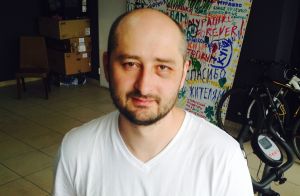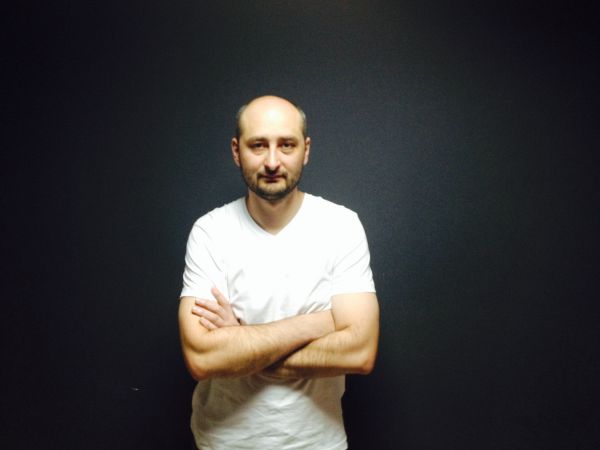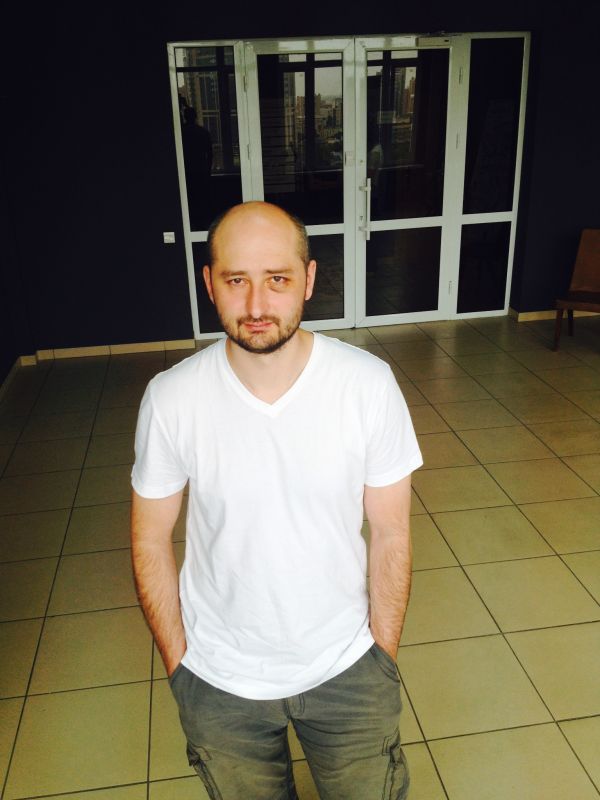 Journalist Arkadiy Babchenko is one of the few colleagues from Russia who is trying to make sense of the situation in the East of Ukraine. Really make sense of it. He is not putting labels, he does not tolerate official definitions and he does not shy away from posing uncomfortable questions, which he is not scared to get a black eye for.
Journalist Arkadiy Babchenko is one of the few colleagues from Russia who is trying to make sense of the situation in the East of Ukraine. Really make sense of it. He is not putting labels, he does not tolerate official definitions and he does not shy away from posing uncomfortable questions, which he is not scared to get a black eye for.
Babchenko is outside of official journalism. His work is his personal blog “Journalism without mediators,” which exists thanks to charitable donations of the readers. For many his blog has become as “coordinate system” of sorts. For others, an excuse to call him a national traitor.
Arkadiy Babchenko reported on the Second Chechen campaign, the Georgian conflict, the coup in Kyrgyzstan, protests in Türkiye as a military correspondent. He worked on Maidan in 2013-2014.
What you saw in Sloviansk, is it in any was different from what you’ve had to face in other hotspots?
All wars are the same. All of them begin out of nowhere. And such situations are almost always followed with talks that soon everything will be over, that there will be no war. And then at some moment, the conflict unfolds and a full-fledged war begins.
Sloviansk’s only difference is that so far, and I have seen it with my own eyes, the Ukrainian army is trying to maximally decrease the number of victims among the peaceful population.
To what extent is this possible in the current conditions?
In any war there are always victims among the peaceful civilians. There are some in Sloviansk, and there will be more. During any war both conflicting sides in various ways lose their humanity, become tired, psychological barriers are broken down. And here, I am sure, there might be our very own Lieutenant Kelly, who during the Vietnam war shot an entire village of peaceful citizens. There may be lynching, kidnapping attempts.
Everything that war is followed with. But so far I can say that the Ukrainian army fully understands these risks and tries to minimise them.
What is the mood among the Ukrainian soldiers?
It’s all right. Military, no thoughts of defeat, no calls to desert. I drove around the roadblocks near Sloviansk and I can say that the National Guardsmen are provided with bulletproof vests, night vision, camouflage. The aid that people are collecting is being delivered there.
What is the attitude of your Russian colleagues to how you are reporting on the events in Sloviansk? As the official position of the Russian TV channels distorts the picture.
The official Russian picture is not a mass medium. It is a propaganda medium. They are two different professions. And we have nothing to do with each other. And I don’t care what Russian propaganda thinks of me. Yes, they call me a national traitor. So what?
Are you not afraid? Recently, arrests on the “Bolotnaya case” have picked up in Russia again. They arrested an activist for “interfering with the police by establishing on their way obstacles in the form of toilet stalls.”
I am not afraid, per sé. I understand very well that I might be arrested at any moment. They might take me, for example, in the airport. Of course, I don’t think it will happen this way. But I will leave some chance for it. What to do. This is our life.
I am not calling people terrorists, I am not tolerant of any evaluative considerations.
I would like to report on the Sloviansk conflict on both sides. But I cannot do it for technical reasons – my portraits are hanging in the Administration of the Republic of Donetsk and in Sloviansk at the roadblocks. And therefore now I can only report on the conflict from one perspective. I haven’t been on the side of the PRD soldiers, but I would like to.
But generally, are you able to report on the conflict from both perspectives?
Generally? It is impossible to report on the conflicts from both sides in any war. You remain on the side you ended up on.
During the two weeks that you’ve been in the east of Ukraine, what events were most memorable?
When I came, the battles only took place at night. Now they started fighting during the day as well. When I spend the night at the roadblock at mount Karachun, there was an artillery duel. They shot at Karachun from the city. From Karachun, the responded with fire at PRD positions. The army does not work in living quarters, as far as I could see. They are working around the perimeter of the city, mainly around industrial quarters. They do not respond with fire at living quarters.
I ended up in the crossfire of a small battle at the third roadblock at the gas station. Two minutes before we left, shooting started from a range of about a kilometre. We went to the third “A” roadblock, and the battle started on another roadblock. Nothing serious was happening while I was there.
How are you dealing with PTSD, how do you switch?
It is not easy. But as I have already become involved in this (the reporting on conflicts in hotspots – editors), now it is easier. It was difficult at first. For the first time I ended up in a hotspot when I served in the army at 18. When I returned, I spent two years studying at university. These two years of my life were completely meaningless. I was not accustomed to understanding the world.
When the second Chechen campaign started, I left on contract. I got lucky, when I returned, I managed to hang on to life. I have a family, a daughter. I live in the capital. Plus I started writing. If not for that, I would have become a drunk for sure. There are very few people in Russia who managed to go on living after Chechnya.
Why? We lost the first Chechen war. Loss in war makes one lose in peaceful life. The soldiers that return from war which they’ve won have it easier.
To your mind, what will the Ukrainian society face after the war in the East of the country? You’ve seen the soldiers, their moods, you can make predictions.
I can say now that Ukraine will in any case have to face the fact that the soldiers which are fighting their know will fall victim to PTSD. The people returning from war to peaceful life always import military “measures” to it: aggression, ease in killing. The value of human lives at war is completely different from that in peaceful times. One’s own life, generally, means nothing, just like that of others.
To prevent this process we have to start engagement right away. We have to build a system of psychological rehabilitations for the soldiers not to end up with a “Vietnam syndrome.”
 Does Russia have such rehab developed? Did you undergo rehab after the Second Chechen war?
Does Russia have such rehab developed? Did you undergo rehab after the Second Chechen war?
There is no rehab system in Russia yet. And there has never been. This possibly explains the level of aggression in society.
To your mind, what should an effective rehabilitation system include?
There has to be a complex program to return to civilian life from military reality. There have to be psychological rehabilitation systems and subsidy programs for the soldiers and, possibly, re-education programs.
Society has to understand that these two realities – the military and civilian one – they are like two parallel lines, they do not intercept. And one has to be returned from that reality.
The older soldiers, which had families and jobs before war, they will have it slightly easier that the young guys, which did not have many things to hang on to in life. Therefore a systematic help program is necessary. To my mind, this is done wonderfully in the Israeli Army. We have to make use of their experience.
How long will the conflict last? Months, years?
I don’t think it will take years. This is an issue of maybe several months starting the beginning of the military phase. We will not be able to avoid storming Sloviansk in any case.
If I were in Kyiv’s shoes, I would start organising refugee camps and tried to transport peaceful civilians from there as much as possible. I don’t think that a second Grozniy will emerge from this conflict. There will be harsh battles, quite bloody, too, but, nevertheless, it will last weeks or months. Later, there will be a police operation, which might last a couple of years.
Can you explain in layman’s terms why Putin’s ratings are increasing? As Russians do understand that what is happening in the East of Ukraine is happening because of the Kremlin.
A decade of propaganda will destroy the mind of anybody. First, the Chechens were the enemy, then the Georgians became the enemy, then the emigrant Tajiks, now the Ukrainians.
They point fingers at one or the other. TV has turned to be a very effective instrument for brainwashing. Some people – the same 15-20% – still know how to think, others, it seems, have forgotten how to do it.
What will the consequences be for Russia?
I hope it will end peacefully. However I have a feeling that Russia is headed towards internal war. Another Pugachev case. Tension is everywhere. Everyone is the enemy. I don’t know where and why it will explode.
Source: Life.Pravda
Translated by Mariya Shcherbinina



